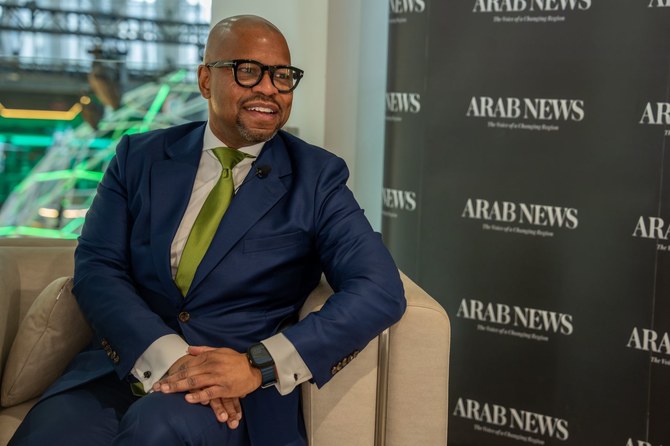
- ARAB NEWS
- 29 Apr 2024

RIYADH: Saudi Arabia’s defense sector is future-ready, with plans to enhance capabilities for “whatever is next,” according to a top Boeing executive.
Speaking to Arab News on the sidelines of the second World Defense Show 2024, Ted Colbert, president and CEO of Boeing Defense, Space, and Security, highlighted that the preparedness will happen through modernizing the Kingdom’s capabilities.
“For the future, it’s about making sure that we continue to extend Saudi Arabia’s ability to be ready for whatever is next. It’s about making sure that you’re modernized and ready, and that shows up in some of those platforms like the F-15,” Colbert, who is also the executive vice president of the company, said.
He added: “We’ve partnered with Saudi Arabia for over 80 years, both in the commercial and the defense side of our business, and we see a really bright future for our partnership and relationships.”
Colbert, who also the executive vice president of Boeing, stated that there is already a strong basis for future developments in the Kingdom, and that is witnessed in a significant portion of the existing portfolio of military equipment, including models like the F-15 C and D, Apaches, and Chinooks.
“The Chinooks are just the most important, most powerful, heavy lift capability around the world. We hope that will continue as well in the Kingdom. We have some new capabilities like the T-7A, which is our trainer,” he explained.
The T-7A is a full training system that the company has developed initially for use in the US, however, it intends to expand its presence globally.
Additionally, the CEO implied there are projects and opportunities in the pipeline but he was unable to provide details about them at this time due to ongoing negotiations that need to be finalized during WDS.
“We have other things I can’t talk about that are in work today, because they need to be signed. We’re close. We’re getting very close. But there are other opportunities we have as well,” Colbert said.
He further added that there are ongoing discussions with the Saudi Arabian Military Industries on future collaboration, indicating more developments to come.
“We remain committed to being a big part of Vision 2030. There are other things we have going on as well. There’s work going on in every dimension to support the Vision 2030 objectives,” the CEO stated.
Underlining the company’s extensive expertise in innovation and artificial intelligence, he further elaborated that Boeing has been involved in the development of AI and autonomy technologies for decades, even before they became widely recognized concepts.
Colbert provided examples such as the MQ-25 autonomous refueling tanker, which incorporates a significant level of autonomy into its design, and other platforms like the MQ-28.
These platforms are digitally designed and utilize modern engineering and manufacturing development techniques, which contribute to their agility and longevity.
On the sustainability front, the CEO noted that the company is actively involved in developing next-generation alternative fuel technologies such as sustainable aviation fuel.
“We’ve demonstrated SAF on obviously our commercial products, but also on like the F-15 as an example. That demonstrates that we can actually fly with sustainable aviation fuel on a fighter,” Colbert noted.
Furthermore, he underlined that approximately 30 percent of Boeing’s operations are international. This global presence, according to Colbert, is set to witness an increase to about 40 percent in the future, indicating significant growth opportunities, particularly within the region and specifically in Saudi Arabia.